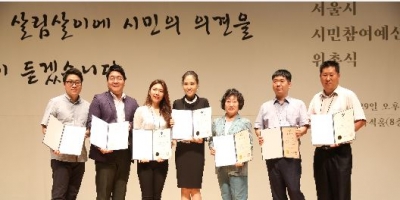제목배경이미지:  [参与式民主]首尔参与式预算制度
[参与式民主]首尔参与式预算制度
Background: Challenges & Objectives
Background
Challenges
Since the launch of the local government system in Korea in 1995, the government has introduced a wide range of direct democratic projects, such as the “Citizens’ Suit,” “Recall Election,” and “Citizens Initiative,” in a bid to allow the local government system to take root and citizens to exercise their right to participate in the decision-making process.
Unfortunately, however, the government made little effort to lay the foundation for the direct democratic process in the area of finance in public administration. Even in the late 1990s, when the basic framework for citizen autonomy was established with the enactment of the Local Autonomy Act and Local Finance Act, the PB system was excluded from any discussion in the field of public administration. It was only in 2003 that the Presidential Committee on Government Innovation and Decentralization finally included the adoption of the PB system in its “Roadmap for Decentralization.”
Civic society, on the other hand, showed interest in making the PB system law as early as 2001. In 2013, the Budget Monitoring Network, a government budget watchdog, officially proposed the introduction of the PB system to local governments, which motivated civil society organizations in all regions to call for the enactment of a PB ordinance in each region.
The top-down approach to the budgeting process prior to the introduction of the PB system excluded taxpayers, the main agent of financial democracy, from the area of finance, an important axis of public administration. Without citizen engagement, the traditional budgeting process was fraught with misallocations of public financial resources and failed to reflect local residents’ needs for funding in their everyday lives.
Objectives
Actions& Implementation
The ultimate purpose of Seoul City’s PB system is to promote citizen engagement in the budgeting process. To that end, Seoul City holds discussions on how to improve the system early every year with the Participatory Budgeting Committee, civic organizations, and financial experts.
For this year’s PB management, Seoul City formed a financial democracy taskforce and held over 20 discussions to draw up plans for PB projects.
Any resident of Seoul is welcome to propose PB projects via the Internet, by mail, or in person over a period of 40 days from March to April every year.
The following is a summary of the process through which PB projects are prioritized:
- 1. Review of project feasibility by each relevant office in terms of legal, economic, and various other factors
- 2. Presentation by citizens who proposed projects and on-site inspections by citizens
- 3. Written reports on project feasibility, efficacy, and budget by civil servants in related areas
- 4. Evaluation of project feasibility, efficacy, and benefits through discussions and deliberative polls
- 5. Selection of top 30 percent of projects in each category at joint public-private meetings and prioritization of the projects in accordance with the evaluation by all Participatory Budgeting Committee members and a majority vote.
- 6. Final decisions made on project priorities based on the approval of the Participatory Budgeting Committee members (40 percent), m-Voting (50 percent), and Budget School members (10 percent).
- 7. Follow-up monitoring of the PB projects by the Participatory Budgeting Committee to identify any budget waste and ensure the smooth implementation of the projects.
Impacts & Replication
1. Creation of Eunpyeong-gu Sharing Center (KRW 1.2 billion)
2. Jung-gu Safe Village for Women (KRW 230 million)
- This project was based on an idea proposed by students majoring in police administration at Dongguk University as a way of promote the safety of women when walking alone at night. It was chosen in 2015 and won the grand prize at the 1st Korean Crime Prevention Awards held by the Seoul Metropolitan Police Agency and the daily newspapier Joongang Ilbo.
3. Seongbuk-gu Multicultural Library (KRW 340 million)
4. Forest Book Bus in Ssangmun Park on Choansan Mountain, Dobong-gu (KRW 100 million)
5. Gwangjin-gu Toy Library (KRW 286 million)
Expectancy effects & Need for Improvement
There is also a budget team in each of the 25 local districts, the members of which include one or two civil servants in charge of the PB system who serve as liaisons to promote cooperation between Seoul City and the local district. In addition, Seoul City operates the Participatory Budgeting Committee, consisting of 250 citizens, and there is a local participatory budgeting committee in each of the 25 local districts.
Seoul City sets aside KRW 50 billion every year for the PB projects, which accounts for as much as 31.7 percent of the KRW 157.1 billion in available public funding, excluding uncontrollable expenditures and mandatory spending, in the citywide budget of KRW 27.5038 trillion (in 2016). Over the last five years, citizens have proposed 10,967 projects, requiring funding of KRW 3.2617 trillion (average of KRW 652.3 billion f 2,193 projects annually), and a total of KRW 240.6 billion has been spent so far for 1,993 PB projects.
It has been Park Won-soon, the mayor of Seoul, who has played the most decisive role in securing financial resources. The PB system was Mayor Park’s major by-election promise in terms of city finance in 2011. He began pursuing the PB system after he took office.
Department / Contact
- International Relations Division, Seoul Metropolitan Government / international@seoul.go.kr